Nutrition for Special Population: Sugary Drink Tax Initiative Report
VerifiedAdded on 2021/05/30
|7
|1603
|58
Report
AI Summary
This report examines the initiative of imposing a sugary drink tax in New Zealand to combat health issues like diabetes and obesity caused by high sugar consumption. It outlines the initiative's details, emphasizing the rationale behind the tax, which aims to reduce the intake of sugary drinks and promote healthier alternatives. The report acknowledges potential challenges in implementation, such as ethical considerations and economic impacts on the food and beverage industry. It then proposes strategies to determine the success of the intervention, including ingredient reformulation, targeted taxation based on sugar content, and mass media campaigns to raise public awareness. The conclusion highlights the importance of reducing sugar consumption and the need for effective strategies to ensure the successful implementation of the sugary drink tax initiative in New Zealand.
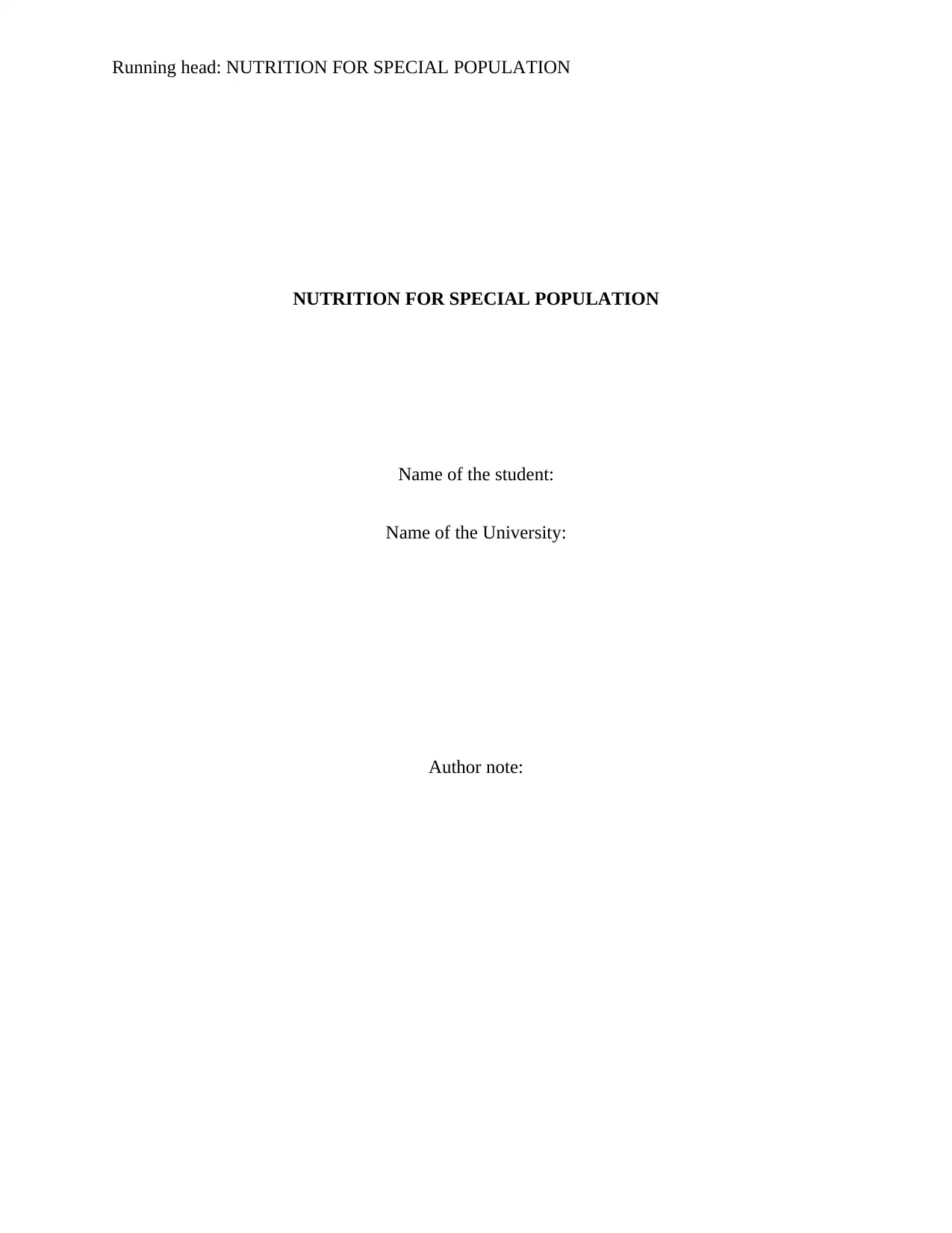
Running head: NUTRITION FOR SPECIAL POPULATION
NUTRITION FOR SPECIAL POPULATION
Name of the student:
Name of the University:
Author note:
NUTRITION FOR SPECIAL POPULATION
Name of the student:
Name of the University:
Author note:
Paraphrase This Document
Need a fresh take? Get an instant paraphrase of this document with our AI Paraphraser
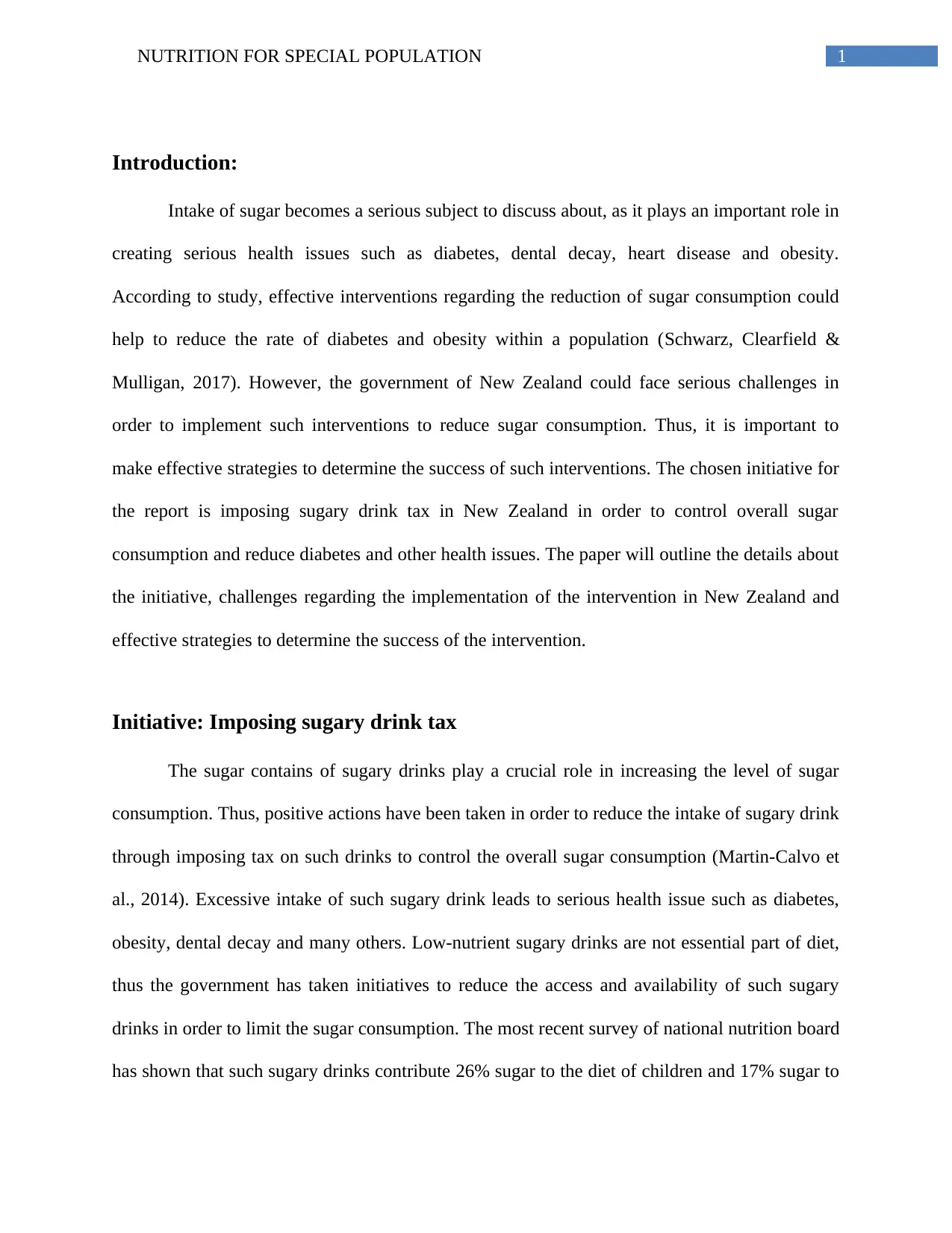
1NUTRITION FOR SPECIAL POPULATION
Introduction:
Intake of sugar becomes a serious subject to discuss about, as it plays an important role in
creating serious health issues such as diabetes, dental decay, heart disease and obesity.
According to study, effective interventions regarding the reduction of sugar consumption could
help to reduce the rate of diabetes and obesity within a population (Schwarz, Clearfield &
Mulligan, 2017). However, the government of New Zealand could face serious challenges in
order to implement such interventions to reduce sugar consumption. Thus, it is important to
make effective strategies to determine the success of such interventions. The chosen initiative for
the report is imposing sugary drink tax in New Zealand in order to control overall sugar
consumption and reduce diabetes and other health issues. The paper will outline the details about
the initiative, challenges regarding the implementation of the intervention in New Zealand and
effective strategies to determine the success of the intervention.
Initiative: Imposing sugary drink tax
The sugar contains of sugary drinks play a crucial role in increasing the level of sugar
consumption. Thus, positive actions have been taken in order to reduce the intake of sugary drink
through imposing tax on such drinks to control the overall sugar consumption (Martin-Calvo et
al., 2014). Excessive intake of such sugary drink leads to serious health issue such as diabetes,
obesity, dental decay and many others. Low-nutrient sugary drinks are not essential part of diet,
thus the government has taken initiatives to reduce the access and availability of such sugary
drinks in order to limit the sugar consumption. The most recent survey of national nutrition board
has shown that such sugary drinks contribute 26% sugar to the diet of children and 17% sugar to
Introduction:
Intake of sugar becomes a serious subject to discuss about, as it plays an important role in
creating serious health issues such as diabetes, dental decay, heart disease and obesity.
According to study, effective interventions regarding the reduction of sugar consumption could
help to reduce the rate of diabetes and obesity within a population (Schwarz, Clearfield &
Mulligan, 2017). However, the government of New Zealand could face serious challenges in
order to implement such interventions to reduce sugar consumption. Thus, it is important to
make effective strategies to determine the success of such interventions. The chosen initiative for
the report is imposing sugary drink tax in New Zealand in order to control overall sugar
consumption and reduce diabetes and other health issues. The paper will outline the details about
the initiative, challenges regarding the implementation of the intervention in New Zealand and
effective strategies to determine the success of the intervention.
Initiative: Imposing sugary drink tax
The sugar contains of sugary drinks play a crucial role in increasing the level of sugar
consumption. Thus, positive actions have been taken in order to reduce the intake of sugary drink
through imposing tax on such drinks to control the overall sugar consumption (Martin-Calvo et
al., 2014). Excessive intake of such sugary drink leads to serious health issue such as diabetes,
obesity, dental decay and many others. Low-nutrient sugary drinks are not essential part of diet,
thus the government has taken initiatives to reduce the access and availability of such sugary
drinks in order to limit the sugar consumption. The most recent survey of national nutrition board
has shown that such sugary drinks contribute 26% sugar to the diet of children and 17% sugar to
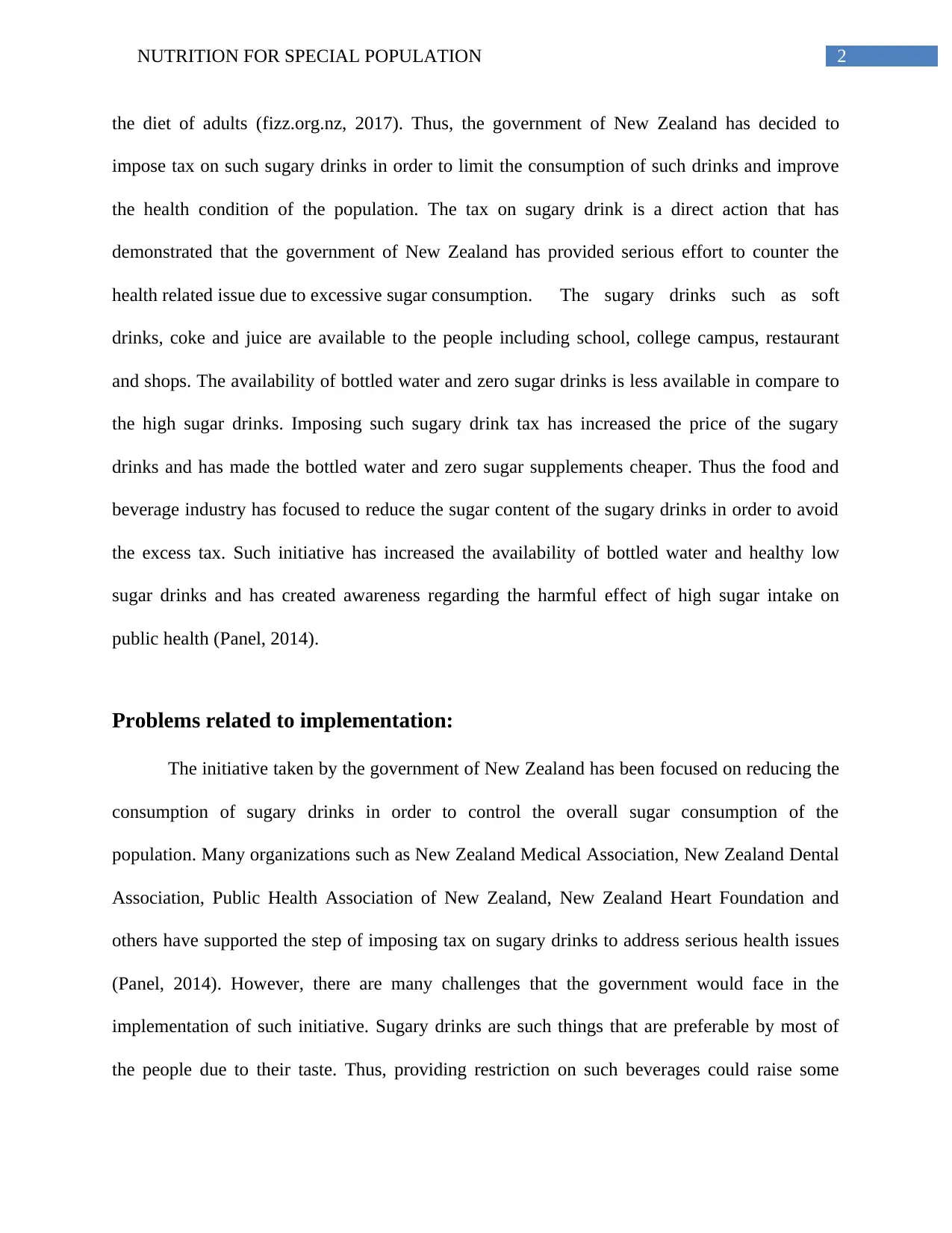
2NUTRITION FOR SPECIAL POPULATION
the diet of adults (fizz.org.nz, 2017). Thus, the government of New Zealand has decided to
impose tax on such sugary drinks in order to limit the consumption of such drinks and improve
the health condition of the population. The tax on sugary drink is a direct action that has
demonstrated that the government of New Zealand has provided serious effort to counter the
health related issue due to excessive sugar consumption. The sugary drinks such as soft
drinks, coke and juice are available to the people including school, college campus, restaurant
and shops. The availability of bottled water and zero sugar drinks is less available in compare to
the high sugar drinks. Imposing such sugary drink tax has increased the price of the sugary
drinks and has made the bottled water and zero sugar supplements cheaper. Thus the food and
beverage industry has focused to reduce the sugar content of the sugary drinks in order to avoid
the excess tax. Such initiative has increased the availability of bottled water and healthy low
sugar drinks and has created awareness regarding the harmful effect of high sugar intake on
public health (Panel, 2014).
Problems related to implementation:
The initiative taken by the government of New Zealand has been focused on reducing the
consumption of sugary drinks in order to control the overall sugar consumption of the
population. Many organizations such as New Zealand Medical Association, New Zealand Dental
Association, Public Health Association of New Zealand, New Zealand Heart Foundation and
others have supported the step of imposing tax on sugary drinks to address serious health issues
(Panel, 2014). However, there are many challenges that the government would face in the
implementation of such initiative. Sugary drinks are such things that are preferable by most of
the people due to their taste. Thus, providing restriction on such beverages could raise some
the diet of adults (fizz.org.nz, 2017). Thus, the government of New Zealand has decided to
impose tax on such sugary drinks in order to limit the consumption of such drinks and improve
the health condition of the population. The tax on sugary drink is a direct action that has
demonstrated that the government of New Zealand has provided serious effort to counter the
health related issue due to excessive sugar consumption. The sugary drinks such as soft
drinks, coke and juice are available to the people including school, college campus, restaurant
and shops. The availability of bottled water and zero sugar drinks is less available in compare to
the high sugar drinks. Imposing such sugary drink tax has increased the price of the sugary
drinks and has made the bottled water and zero sugar supplements cheaper. Thus the food and
beverage industry has focused to reduce the sugar content of the sugary drinks in order to avoid
the excess tax. Such initiative has increased the availability of bottled water and healthy low
sugar drinks and has created awareness regarding the harmful effect of high sugar intake on
public health (Panel, 2014).
Problems related to implementation:
The initiative taken by the government of New Zealand has been focused on reducing the
consumption of sugary drinks in order to control the overall sugar consumption of the
population. Many organizations such as New Zealand Medical Association, New Zealand Dental
Association, Public Health Association of New Zealand, New Zealand Heart Foundation and
others have supported the step of imposing tax on sugary drinks to address serious health issues
(Panel, 2014). However, there are many challenges that the government would face in the
implementation of such initiative. Sugary drinks are such things that are preferable by most of
the people due to their taste. Thus, providing restriction on such beverages could raise some
⊘ This is a preview!⊘
Do you want full access?
Subscribe today to unlock all pages.

Trusted by 1+ million students worldwide
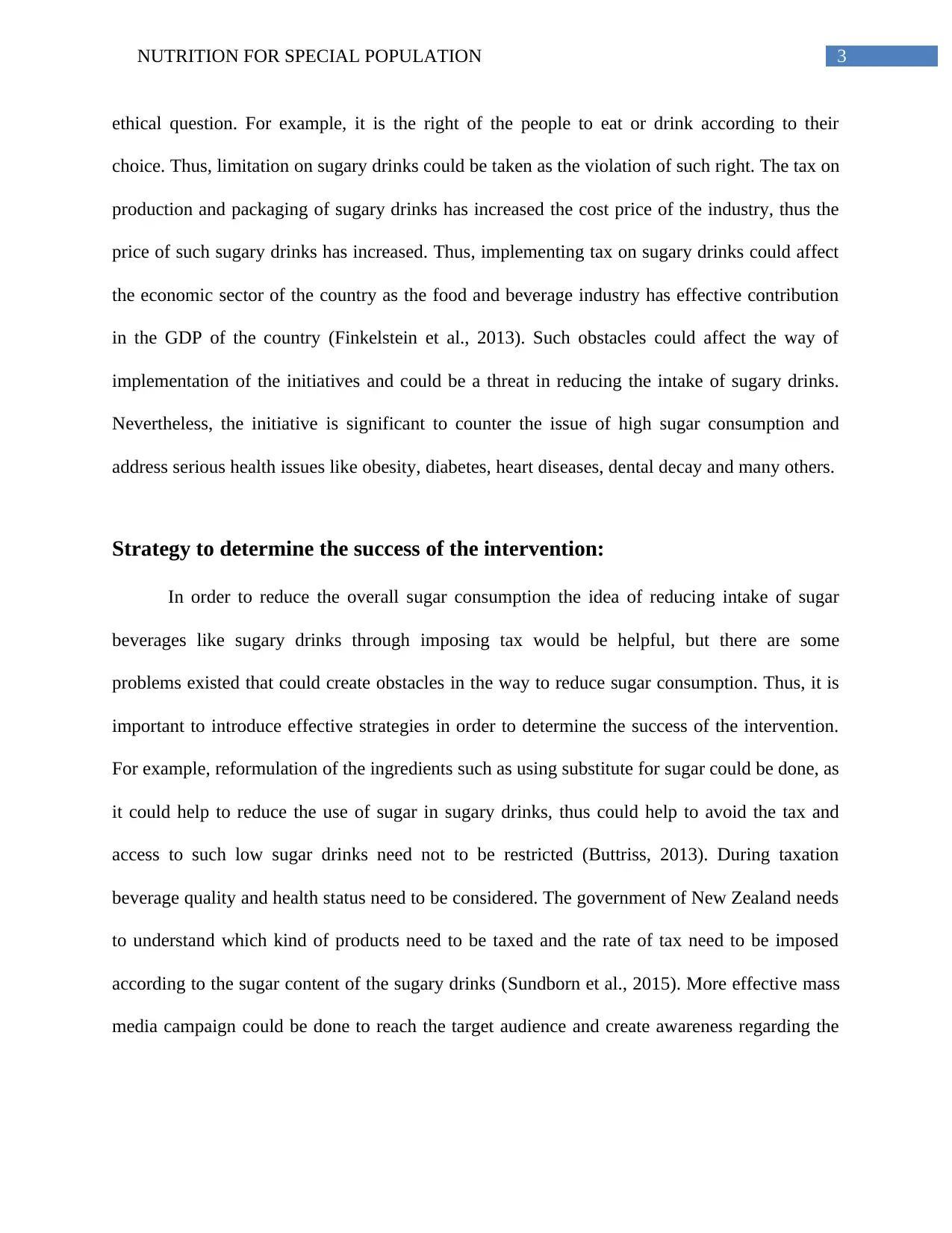
3NUTRITION FOR SPECIAL POPULATION
ethical question. For example, it is the right of the people to eat or drink according to their
choice. Thus, limitation on sugary drinks could be taken as the violation of such right. The tax on
production and packaging of sugary drinks has increased the cost price of the industry, thus the
price of such sugary drinks has increased. Thus, implementing tax on sugary drinks could affect
the economic sector of the country as the food and beverage industry has effective contribution
in the GDP of the country (Finkelstein et al., 2013). Such obstacles could affect the way of
implementation of the initiatives and could be a threat in reducing the intake of sugary drinks.
Nevertheless, the initiative is significant to counter the issue of high sugar consumption and
address serious health issues like obesity, diabetes, heart diseases, dental decay and many others.
Strategy to determine the success of the intervention:
In order to reduce the overall sugar consumption the idea of reducing intake of sugar
beverages like sugary drinks through imposing tax would be helpful, but there are some
problems existed that could create obstacles in the way to reduce sugar consumption. Thus, it is
important to introduce effective strategies in order to determine the success of the intervention.
For example, reformulation of the ingredients such as using substitute for sugar could be done, as
it could help to reduce the use of sugar in sugary drinks, thus could help to avoid the tax and
access to such low sugar drinks need not to be restricted (Buttriss, 2013). During taxation
beverage quality and health status need to be considered. The government of New Zealand needs
to understand which kind of products need to be taxed and the rate of tax need to be imposed
according to the sugar content of the sugary drinks (Sundborn et al., 2015). More effective mass
media campaign could be done to reach the target audience and create awareness regarding the
ethical question. For example, it is the right of the people to eat or drink according to their
choice. Thus, limitation on sugary drinks could be taken as the violation of such right. The tax on
production and packaging of sugary drinks has increased the cost price of the industry, thus the
price of such sugary drinks has increased. Thus, implementing tax on sugary drinks could affect
the economic sector of the country as the food and beverage industry has effective contribution
in the GDP of the country (Finkelstein et al., 2013). Such obstacles could affect the way of
implementation of the initiatives and could be a threat in reducing the intake of sugary drinks.
Nevertheless, the initiative is significant to counter the issue of high sugar consumption and
address serious health issues like obesity, diabetes, heart diseases, dental decay and many others.
Strategy to determine the success of the intervention:
In order to reduce the overall sugar consumption the idea of reducing intake of sugar
beverages like sugary drinks through imposing tax would be helpful, but there are some
problems existed that could create obstacles in the way to reduce sugar consumption. Thus, it is
important to introduce effective strategies in order to determine the success of the intervention.
For example, reformulation of the ingredients such as using substitute for sugar could be done, as
it could help to reduce the use of sugar in sugary drinks, thus could help to avoid the tax and
access to such low sugar drinks need not to be restricted (Buttriss, 2013). During taxation
beverage quality and health status need to be considered. The government of New Zealand needs
to understand which kind of products need to be taxed and the rate of tax need to be imposed
according to the sugar content of the sugary drinks (Sundborn et al., 2015). More effective mass
media campaign could be done to reach the target audience and create awareness regarding the
Paraphrase This Document
Need a fresh take? Get an instant paraphrase of this document with our AI Paraphraser
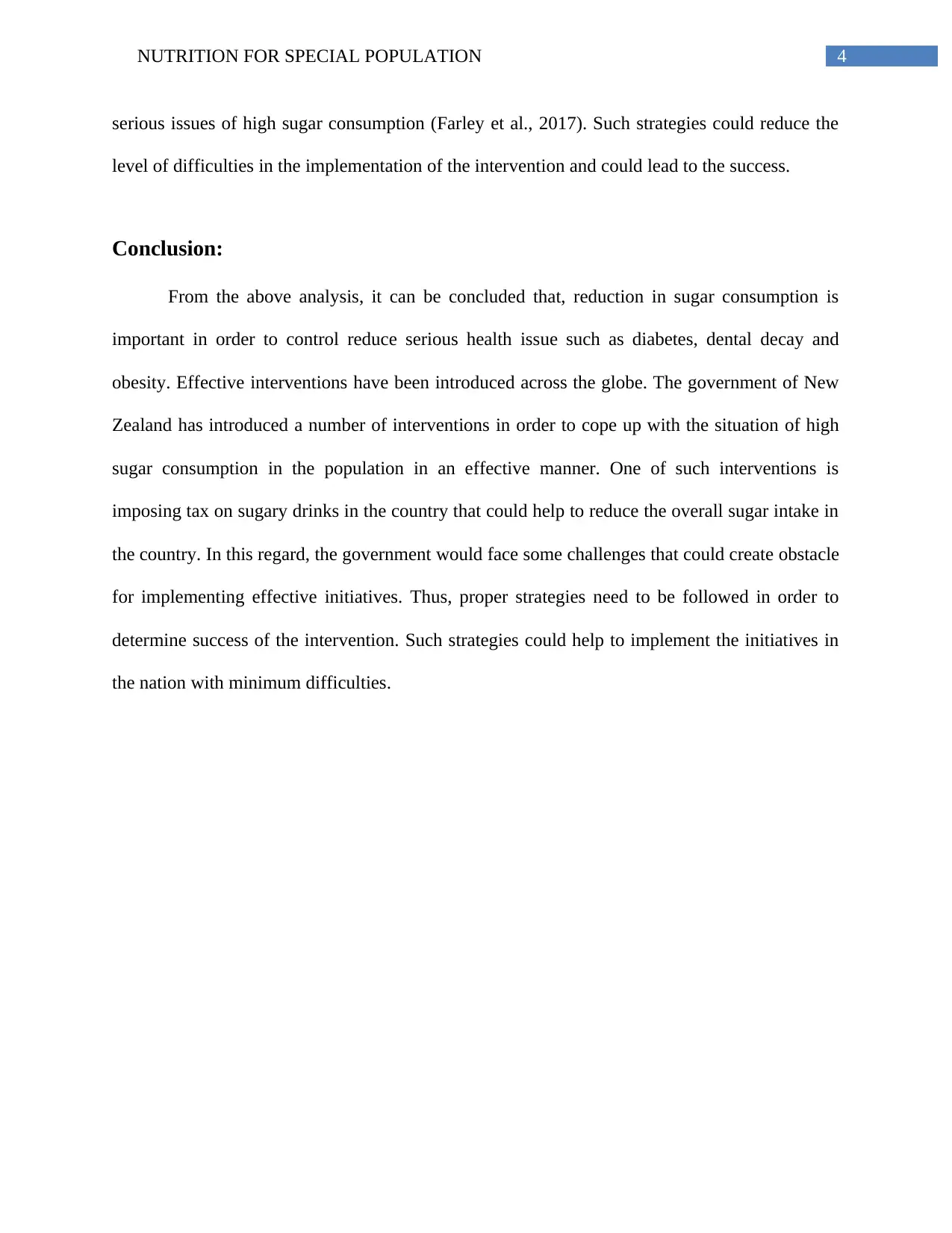
4NUTRITION FOR SPECIAL POPULATION
serious issues of high sugar consumption (Farley et al., 2017). Such strategies could reduce the
level of difficulties in the implementation of the intervention and could lead to the success.
Conclusion:
From the above analysis, it can be concluded that, reduction in sugar consumption is
important in order to control reduce serious health issue such as diabetes, dental decay and
obesity. Effective interventions have been introduced across the globe. The government of New
Zealand has introduced a number of interventions in order to cope up with the situation of high
sugar consumption in the population in an effective manner. One of such interventions is
imposing tax on sugary drinks in the country that could help to reduce the overall sugar intake in
the country. In this regard, the government would face some challenges that could create obstacle
for implementing effective initiatives. Thus, proper strategies need to be followed in order to
determine success of the intervention. Such strategies could help to implement the initiatives in
the nation with minimum difficulties.
serious issues of high sugar consumption (Farley et al., 2017). Such strategies could reduce the
level of difficulties in the implementation of the intervention and could lead to the success.
Conclusion:
From the above analysis, it can be concluded that, reduction in sugar consumption is
important in order to control reduce serious health issue such as diabetes, dental decay and
obesity. Effective interventions have been introduced across the globe. The government of New
Zealand has introduced a number of interventions in order to cope up with the situation of high
sugar consumption in the population in an effective manner. One of such interventions is
imposing tax on sugary drinks in the country that could help to reduce the overall sugar intake in
the country. In this regard, the government would face some challenges that could create obstacle
for implementing effective initiatives. Thus, proper strategies need to be followed in order to
determine success of the intervention. Such strategies could help to implement the initiatives in
the nation with minimum difficulties.
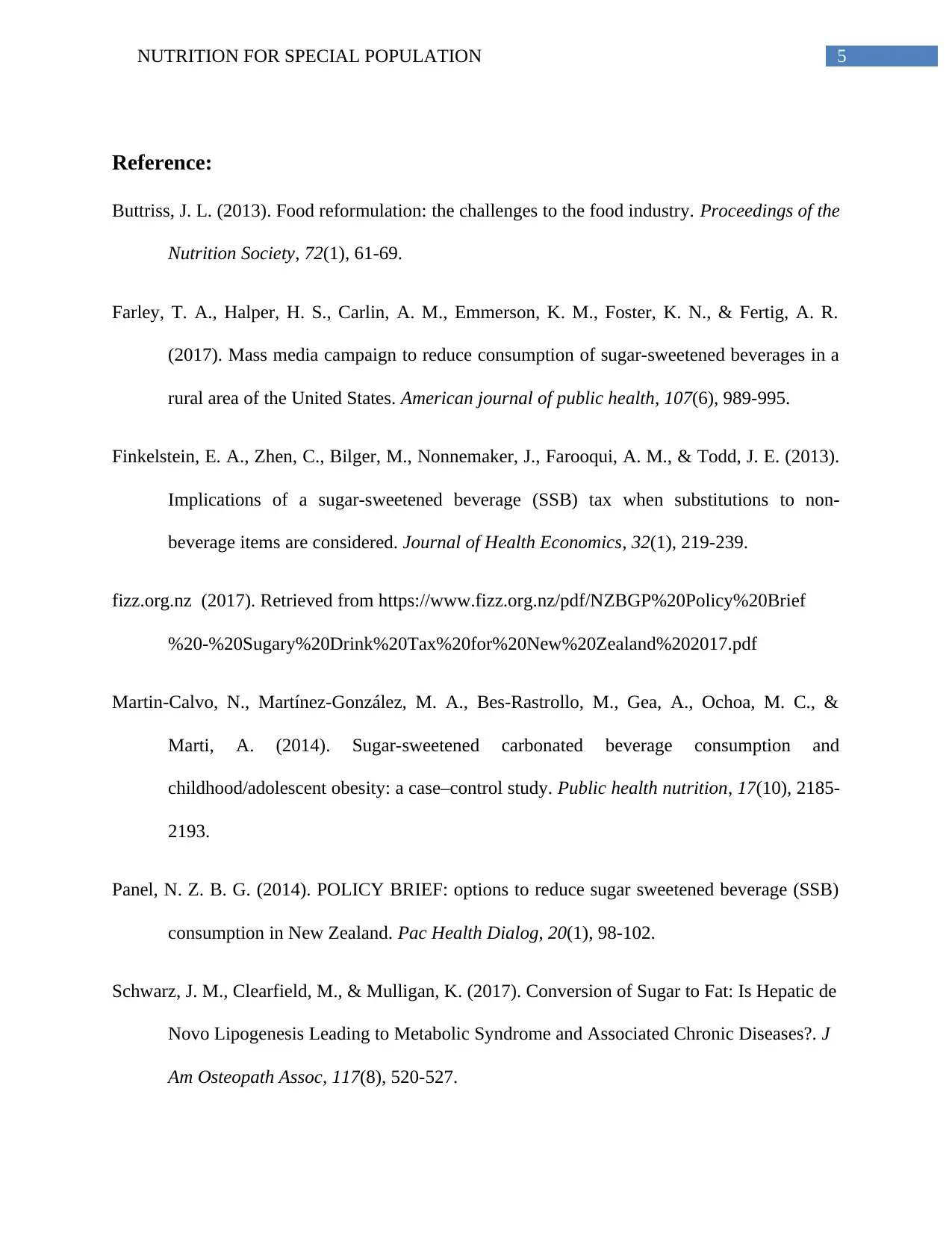
5NUTRITION FOR SPECIAL POPULATION
Reference:
Buttriss, J. L. (2013). Food reformulation: the challenges to the food industry. Proceedings of the
Nutrition Society, 72(1), 61-69.
Farley, T. A., Halper, H. S., Carlin, A. M., Emmerson, K. M., Foster, K. N., & Fertig, A. R.
(2017). Mass media campaign to reduce consumption of sugar-sweetened beverages in a
rural area of the United States. American journal of public health, 107(6), 989-995.
Finkelstein, E. A., Zhen, C., Bilger, M., Nonnemaker, J., Farooqui, A. M., & Todd, J. E. (2013).
Implications of a sugar-sweetened beverage (SSB) tax when substitutions to non-
beverage items are considered. Journal of Health Economics, 32(1), 219-239.
fizz.org.nz (2017). Retrieved from https://www.fizz.org.nz/pdf/NZBGP%20Policy%20Brief
%20-%20Sugary%20Drink%20Tax%20for%20New%20Zealand%202017.pdf
Martin-Calvo, N., Martínez-González, M. A., Bes-Rastrollo, M., Gea, A., Ochoa, M. C., &
Marti, A. (2014). Sugar-sweetened carbonated beverage consumption and
childhood/adolescent obesity: a case–control study. Public health nutrition, 17(10), 2185-
2193.
Panel, N. Z. B. G. (2014). POLICY BRIEF: options to reduce sugar sweetened beverage (SSB)
consumption in New Zealand. Pac Health Dialog, 20(1), 98-102.
Schwarz, J. M., Clearfield, M., & Mulligan, K. (2017). Conversion of Sugar to Fat: Is Hepatic de
Novo Lipogenesis Leading to Metabolic Syndrome and Associated Chronic Diseases?. J
Am Osteopath Assoc, 117(8), 520-527.
Reference:
Buttriss, J. L. (2013). Food reformulation: the challenges to the food industry. Proceedings of the
Nutrition Society, 72(1), 61-69.
Farley, T. A., Halper, H. S., Carlin, A. M., Emmerson, K. M., Foster, K. N., & Fertig, A. R.
(2017). Mass media campaign to reduce consumption of sugar-sweetened beverages in a
rural area of the United States. American journal of public health, 107(6), 989-995.
Finkelstein, E. A., Zhen, C., Bilger, M., Nonnemaker, J., Farooqui, A. M., & Todd, J. E. (2013).
Implications of a sugar-sweetened beverage (SSB) tax when substitutions to non-
beverage items are considered. Journal of Health Economics, 32(1), 219-239.
fizz.org.nz (2017). Retrieved from https://www.fizz.org.nz/pdf/NZBGP%20Policy%20Brief
%20-%20Sugary%20Drink%20Tax%20for%20New%20Zealand%202017.pdf
Martin-Calvo, N., Martínez-González, M. A., Bes-Rastrollo, M., Gea, A., Ochoa, M. C., &
Marti, A. (2014). Sugar-sweetened carbonated beverage consumption and
childhood/adolescent obesity: a case–control study. Public health nutrition, 17(10), 2185-
2193.
Panel, N. Z. B. G. (2014). POLICY BRIEF: options to reduce sugar sweetened beverage (SSB)
consumption in New Zealand. Pac Health Dialog, 20(1), 98-102.
Schwarz, J. M., Clearfield, M., & Mulligan, K. (2017). Conversion of Sugar to Fat: Is Hepatic de
Novo Lipogenesis Leading to Metabolic Syndrome and Associated Chronic Diseases?. J
Am Osteopath Assoc, 117(8), 520-527.
⊘ This is a preview!⊘
Do you want full access?
Subscribe today to unlock all pages.

Trusted by 1+ million students worldwide
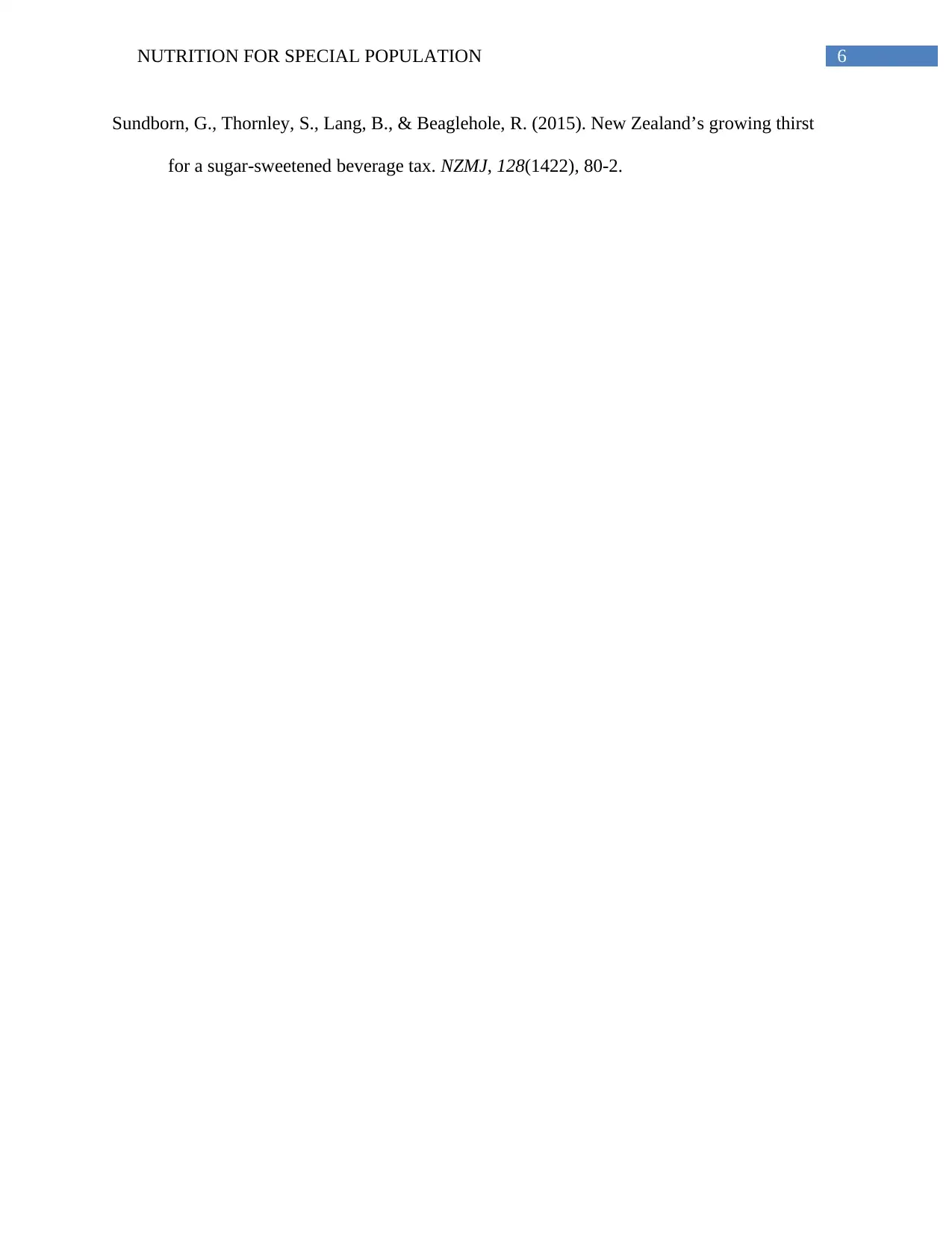
6NUTRITION FOR SPECIAL POPULATION
Sundborn, G., Thornley, S., Lang, B., & Beaglehole, R. (2015). New Zealand’s growing thirst
for a sugar-sweetened beverage tax. NZMJ, 128(1422), 80-2.
Sundborn, G., Thornley, S., Lang, B., & Beaglehole, R. (2015). New Zealand’s growing thirst
for a sugar-sweetened beverage tax. NZMJ, 128(1422), 80-2.
1 out of 7
Related Documents
Your All-in-One AI-Powered Toolkit for Academic Success.
+13062052269
info@desklib.com
Available 24*7 on WhatsApp / Email
![[object Object]](/_next/static/media/star-bottom.7253800d.svg)
Unlock your academic potential
Copyright © 2020–2026 A2Z Services. All Rights Reserved. Developed and managed by ZUCOL.





